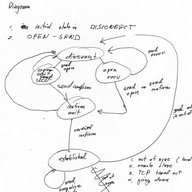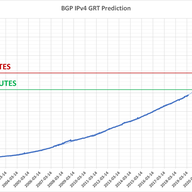
BGP Path Attribute Filtering - A Powerful Tool to Mitigate Alien Attributes
• 11 min read
On 2 June 2023, there was a disruption in the global Internet routing, caused by the inability of BGP border routers to process an "alien" BGP Attribute. A nice RIPE Labs article about this event was published back then. Well, the alien turned out to be a "legal alien" - a known attribute, introduc…


“Hello, great article and I love the topic too. An I really would like to know: 1. What is the total count of routers in the world that carry the full routing-table? My guess is: 10.000+ 2. How many routers are affected to be upgraded between now and the 1Mio destinations in 2022? 3. I wonder if it could be (roughly) calculated how much one single entry currently costs in the global table? regards, Kurt”
Hi Kurt, Interesting questions, real thinking experiments. :) Let's think about it together. 1. Assume the classical 80/20 rule here. According to bgp.potaroo.net, there are ~70,000 ASNs in use worldwide at the moment, 25,000 of those advertising a single prefix. We can freely assume 80% of small networks don't use the full GRT, 80% of the large ones do. This gives 61,000 networks using GRT. Let's round this up to 60,000. Networks can have anything from one single box up to 10,000 routers (large Tier-1s) and, as a rule of thumb, most routers in large carrier networks do have the full BGP GRT. So, let's assume 500 edge (BGP-speaking) routers per network on average. This gives ~30M BGP routers worldwide. Much more than 10000 in any case. :) 2. As said in the article, most modern high-end routers (manufactured after 2012 at least) can handle way more than 1M prefixes in the FIB. So the chance for someone to still have a 10+ years old box connected to an Internet Exchange or having full GRT is small. Especially after the 512K hiccups, when everybody hopefully learnt their lessons. The 768K event had near to zero impact, so chances are great that everyone is more proactive these days, so we won't have large impact this time either. 3. This one is difficult to estimate, really. RIB uses RAM, which is normally ~1M/prefix per single copy of the GRT in the BGP RIB set (Adj-RIB-in + Loc-RIB + Adj-RIB-out), but RAM is typically not an issue. Even older network processors can take more than a single copy of the GRT on it and are scaled to 4M+ prefixes. The issue is in the FIB, which typically uses TCAM and TCAM stores prefixes in a tree-like fashion, so its utilization depends on the route aggregation efficiency and amount of overlapped prefixes. Each ASIC vendor has its own prefix store and lookup algorithm and this information is mostly restricted and/or protected as patents. Regards, Beri
Showing 1 comment(s)